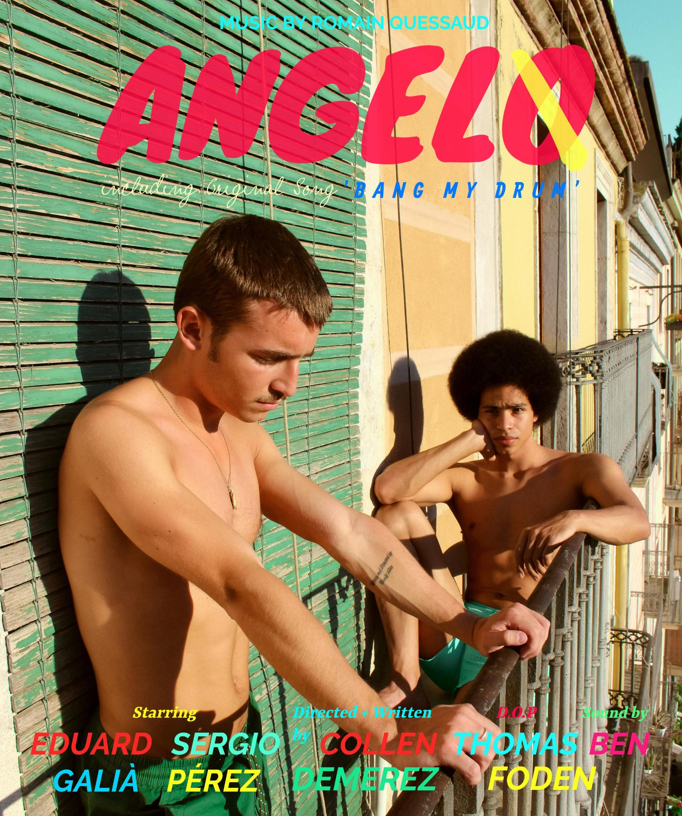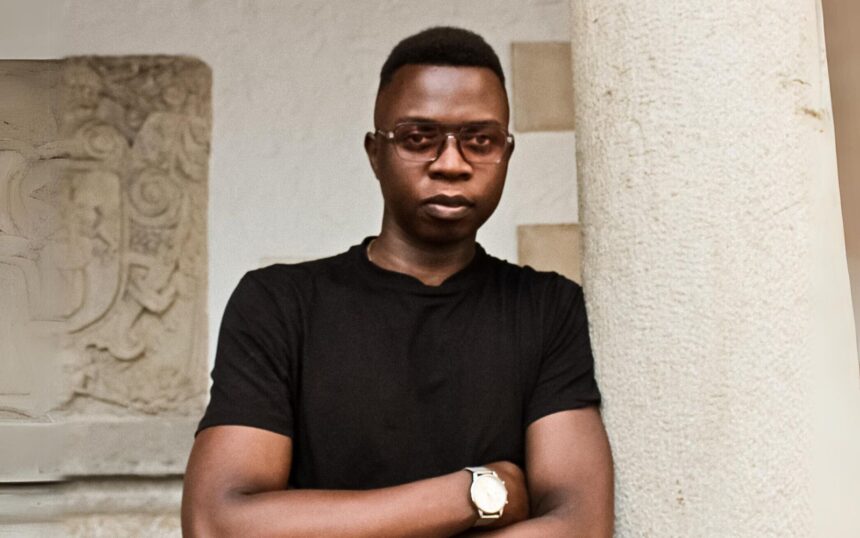Welcome to Hurwitz.TV’s Directors Interview Series, where we chat with some of the most influential filmmakers from all over the world.
In this series, you’ll have the opportunity to gain profound insights from the minds and creative journeys of these cinematic storytellers. Our goal is to explore the art of filmmaking, discover the inspirations and motivations that drive these directors, and delve into the captivating stories behind their remarkable works. From seasoned veterans to emerging talents, we talk about their artistic influences, memorable experiences, and the challenges they’ve faced along the way.
Today, I am joined by filmmaker Collen Demerez, known for his short films “Cry Zach” and “Angel.” We talked about his journey into filmmaking, the advice that shaped his artistic path, his sources of inspiration, and the challenges and rewards of creating films.
Collen shared how his love for storytelling and the deep sense of purpose it gave him led him to become a filmmaker. He described filmmaking as the highest form of storytelling and a beautiful, immersive experience that requires all aspects of his creativity.

Dennis: Thank you for joining us, Collen! To kick things off, can you share the story of you wanting and deciding to become a filmmaker? What drove you to pursue this career path?
Collen: My pleasure. Thank you for having me. I think I always knew I wanted to be in the industry of making films and tv but for a long time I didn’t know what as. I realised in my early 20s how much I loved storytelling. It gave me such purpose on a deeper level. Filmmaking is the highest form of story telling to me. When done right, films can change people’s lives, they’ve changed and inspire me all my life. I also realised I’m happiest when I’m making a film because it feels like I’m using every part of my brain and body. It requires so much skill and attention that it spares no creativity, nothing goes to waste. You have to surrender yourself to it. It’s a beautiful experience and I feel very privileged to be able to do it even on a small scale.
Dennis: What was the greatest piece of advice given by a mentor that shaped the artist that you are today?
Collen: That you don’t have to wait for permission or for someone to tell you you’re good to create. That it’s important to just create with the means you have and in the form of just creating in the humblest of ways and making mistakes, you learn and that within itself is something to marvel at.
Dennis: Which movies and filmmakers inspired you the most?
Collen: I am inspired by many films but I think the few that have really moulded me into a filmmaker are films like Jongens, Moonlight, Fallen Angels, Betty Blue, A Single Man, and more upbeat fun films like 13 Going on 30 and films like The Breakfast Club and Cheetah Girl 2 – which as silly as it sounds was the movie that made me want to film in Spain one day and inspired the name of the this upcoming short film. As for filmmakers that really inspire me, especially in making ANGEL, I am really inspired by Pedro Almodóvar films, Bigas Luna, Christophe Honoré, Tom Ford and Barry Jenkins. I think you see little nods to them in the film.
Dennis: What are the most challenging and rewarding parts of making a movie?
Collen: I think making any kind of film is challenging, no matter how small or big. They’re so many moving parts that I could name a million things, from small budget to time management but I think for me the most challenging and most rewarding part is the vulnerability in making a film. I think more so because I write my films myself and they’re very close to my feelings about life. Making films that are honest and revealing is very exposing. And I’m learning how truly intimate filmmaking is, so much more intimate than anything I’ve done, maybe even more than making love (laughs). It’s someone wearing your thoughts and dreams as their personhood and it’s everyone in the room agreeing to make that space safe for both you and the performers to express that. It requires everyone to believe in you and there’s nothing more sacred than that. Also then passing that creation of such vulnerability to an audience and trusting that they will take it in with an open heart, is truly beautiful, especially when they really connect with it.
Dennis: Let’s talk about your debut short film “Cry Zach,” which I’ve actually already seen back in mid-2021, and I thought it was beautiful. It went quite viral in my film community, and I thought your depiction of mental health struggles was equally cathartic and devastating. Can you talk about your creative process in making this film? And what led you to choose this subject matter for your first film?
Collen: Oh wow, I wasn’t aware of that. Thank you. I’m very proud of Cry Zach. I did not expect it to do nearly as well as it did, we kind of stumbled into it. Cry, Zach was I think the fastest I had ever written something, but it was in my head for a while. I kept spinning the thought of it in my head for a few months and one night I just wrote the whole script in my voice notes app while washing the dishes, I still have the 12 minutes recording (laughs). Of course when I wrote it down, it went through changes here and there, but it stayed the very same script I wrote that night. I think with that short it came from a place of real devastation about the struggle of being alive. It just felt almost obligatory to make that my first visual story, I think it’s what people around me and in the ether needed to hear from me. It’s what I needed to hear from myself. Maybe that’s why it came out so fully formed despite me being such an amateur at writing or making a short film. I thank my very small team for bringing it to life. I’m very glad people liked it because I just wanted for people to feel seen and heard. We all struggle with mental health, but we aren’t always given permission to say it out loud, especially men. So, even though we made it for a shoe string and a packet of crisps, I feel very lucky the core message broke through and really genuinely helped people.
Dennis: Your second short film “Angel” is about to come out real soon. Walk me through your experience making this film, and what can audiences expect?
Collen: Angel is a long departure from my last short. It’s a very ambitious short with a bigger yet still next to nothing budget. Firstly, it’s in Spanish with very little English and we filmed it in Catalonia, Spain. It’s shot on Digital and on 16mm film. It’s almost 30 minutes in duration, so a lot longer than Cry, Zach. Mostly, it’s a story about self discovery and the challenges of growing up and separating from someone you love. I wanted to explore the parts of discovering your sexuality that can be very healing, instead of destructive like we’ve seen a million times before. I say that having made my first film about a dark subject matter with insinuated queer characters. So this is my making up for that. I wanted to be very clear and open with this film. It is much more unapologetic and experimental than my last short film. I think most people would think they’re made by two different people.
It was a joy to make but the experience was very different from making Cry Zach. It was very intense, of course in pre production and filming because I was underprepared for what it took to make a short film of this scale. We had four days to film but we managed to step up to the task as a small team. However, post production was very difficult. Angel required the attention of a much longer film, because it had so many moving parts. I spent about 4-5 months editing it and then 2 months colour grading it with Tom Foden the DP. Then another month doing all the other tedious stuff like subtitling and a little more editing (which was made more difficult by the fact I don’t speak Catalan.) Even after I finished everything, it’s been hard to really detox from it, there’s not a day I don’t think about it or the actors. It’s become something compulsive because your brain becomes obsessive about trying to get it as good as possible. All that said, it’s been a labour of love. I’ve certainly learned a lot from the process, mostly what not to do next time (laughs).
Dennis: Lastly, name a filmmaker or an actor you would love to collaborate with and why?
Collen: I’m not too sure. The people who I love, especially the smaller artists, are so fully themselves and I like to take that in as an audience member with no involvement in their projects because I get to just enjoy their stories. That being said, TOM FORD or Luca Guadagnino, if you’re reading this I’ll make anything with you. Also Timmy Chalamet and Zendaya, I have a script I’m waiting till I’m big enough to give to them. I’m a huge fan of those artists, they inspire me in their authenticity to themselves. How much they give to their craft and the daring decisions they make even when no one believes in them. It’s taught me to push on as an artist even when you don’t have the support of your community or the industry.




